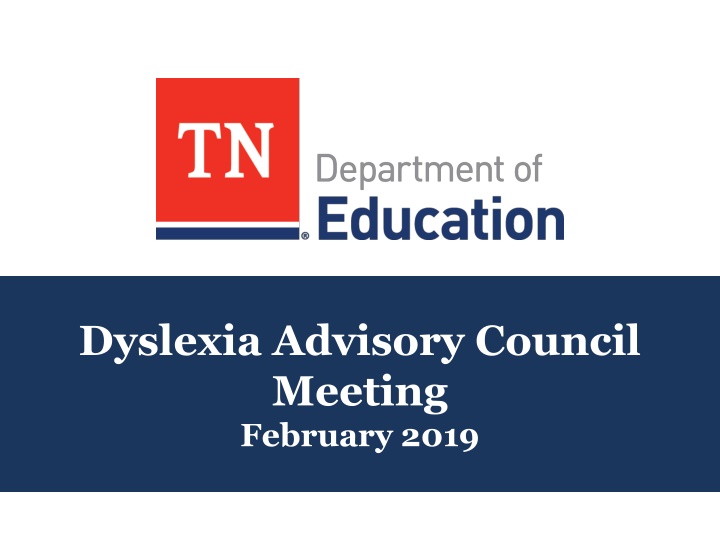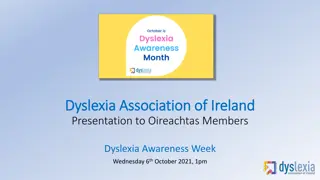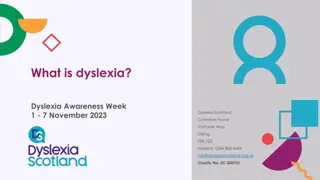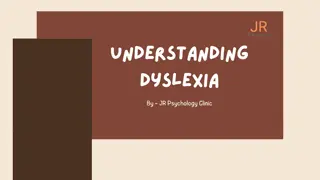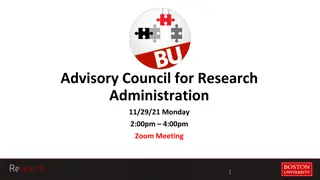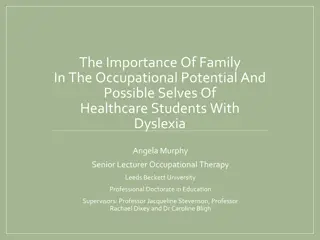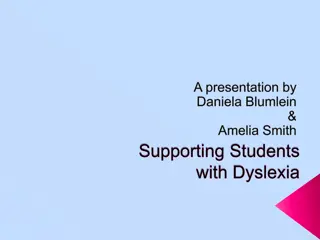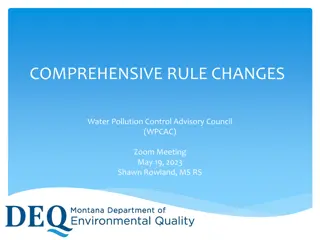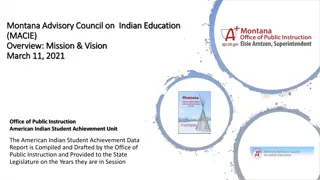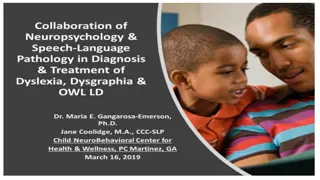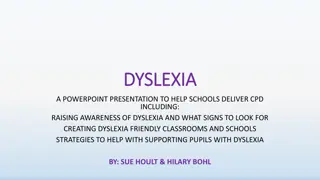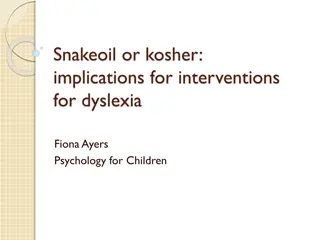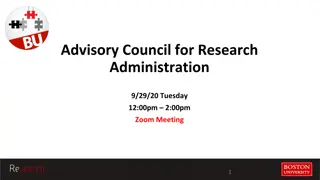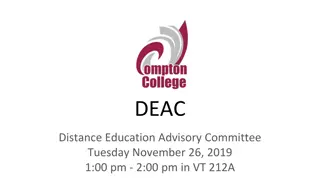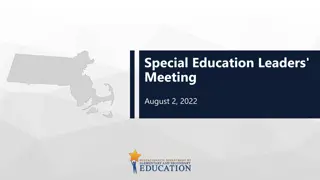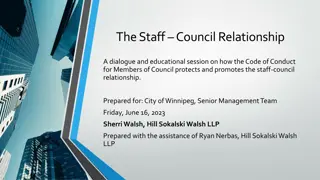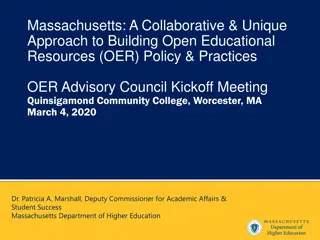Dyslexia Advisory Council Meeting and Professional Learning Updates
The content provides information about the Dyslexia Advisory Council Meeting in February 2019, updates on department activities, professional learning opportunities such as SPDG 2.0 ACCESS Part 2 Trainings, regional training dates for ACCESS, dyslexia training updates, participant registration details, literacy updates, and insights on the role of teachers, students, and instructional materials in learning. Additionally, it outlines the English Language Arts Adoption process from Spring 2018 to Fall 2020.
Download Presentation

Please find below an Image/Link to download the presentation.
The content on the website is provided AS IS for your information and personal use only. It may not be sold, licensed, or shared on other websites without obtaining consent from the author.If you encounter any issues during the download, it is possible that the publisher has removed the file from their server.
You are allowed to download the files provided on this website for personal or commercial use, subject to the condition that they are used lawfully. All files are the property of their respective owners.
The content on the website is provided AS IS for your information and personal use only. It may not be sold, licensed, or shared on other websites without obtaining consent from the author.
E N D
Presentation Transcript
Dyslexia Advisory Council Meeting February 2019
Updates Professional Learning SPDG 2.0 ACCESS Part 2 Trainings
ACCESS Regional Training Dates Feb 21: Murfreesboro, TN Feb 27: Jackson, TN Feb 28: Cookeville Mar 28: Lenoir City Mar 29: Kingsport 4
Dyslexia Training Update 5
Training Participants Those registered who had previously participated in a department dyslexia training:
Training Registered Participants District Administration/ Support 2% Assessment Specialist 6% Building Administration 13% Special Education Supervisor 13% Special Education Teacher 7% RTI Coordinator 27% Total registered= 184 Interventionist 32% 7
Teachers + Students + Materials Students learn primarily through interactions with teachers and instructional materials. ...instructional materials exercise their influence on learning directly as well as by influencing teachers instructional choices and behavior, which makes instructional materials all the more important. Source: Chingos and Whitehurst (2012) 10
English Language Arts Adoption Spring 2018- Summer 2019 Spring 2018 Fall 2018 Fall 2019 Fall 2020 Convened publisher summit to communicate more rigorous instructional expectations Publishers begin designing new instructional materials to meet Tennessee expectations Screening instruments approved by commission Publishers sent toolkit and invitations to bid Application for reviewers is posted Train reviewers Publishers submit materials Materials undergo review Publishers have opportunity to revise content based on first round of feedback Final list of materials that meet the criteria of the rubric are approved by commission and state board Districts assemble teams to begin selection process New instructional materials are implemented in classroom Training on new instructional materials is provided by districts to teachers 11
Ready with Resources Network Fall 2018High Quality Spring 2019Planning for Fall 2019Ensuring High Spring 2020Managing Materials Adoption and Implementation Quality Professional Learning and Supports Implementation and Change 12
Next Steps 14
Universal Screening Process
Universal Screening and Progress Monitoring Request for Proposals (RFP) Districts need optimal tools to screen and progress monitor students due to their part in high stakes decision making and Child Find obligations District feedback about universal screening and progress monitoring tools indicated the desire to explore other options Contracts with approved vendors expire July 2019 Measures have changed since original RFP Additional measures may have been developed since 2014 Say Dyslexia legislation outlines specific requirements about screening involving characteristics of dyslexia 16
What is the timeline of the RFP and what does it entail? Collecting feedback on the RFP from department and district focus groups Extensive review of submitted vendor proposals by a cross-divisional department team Release of a list of department-approved vendors for universal screening and progress monitoring tools from which districts are encouraged to select 17
How will the RFP impact districts? Selection of universal screening and progress monitoring tools Budgeting and resources Supplemental IDEA progress monitoring funds 18
Feedback How do we continually help districts improve and refine their screening processes? 19
Dyslexia-Specific Interventions
Dyslexia-Specific Interventions Systematic and cumulative Explicit Multisensory Intervention Aligned to individual student need Language based
Dyslexia-Specific Interventions Imagine this is a reading intervention you are considering purchasing for your district. Use the provided markers to identify the category of the characteristic. Systematic & cumulative Explicit Multisensory Language based Aligned to individual student need
Feedback How do we continue to support districts in improving and refining effective dyslexia-specific interventions?
District Reporting Soft data pulls occurring periodically throughout the school year Technical assistance shifting more towards refining who is being coded and not if students are being coded
Professional Learning and Resources 26
Website In what ways can we make the current resources more accessible to districts through the website? What avenues can the current resources be shared in order to increase access?
Professional Learning In what ways can professional learning facilitated by the department be more accessible to districts? What key audiences need to be prioritized in building their knowledge? What are ways we can optimize information getting to the school/teacher level? How can we encourage districts to initiate and lead their own professional learning opportunities? What does the specific focus of future professional learning need to center around? 28
